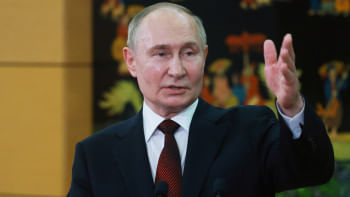“Then they came for me”

In his bestselling book, The Black Swan (2007), Nassim Nicholas Taleb developed an interesting theory. According to Taleb, in the Old World people were convinced that all swans were white. The unexpected sighting of a black swan in Australia exposed the fragility of conventional knowledge. Taleb thus defines the "Black Swan" as a highly improbable event with three main characteristics. First, it is an outlier. Second, it creates a tremendous impact. Third, after the fact we often rationalise the event with the benefit of hindsight. The metaphorical concept can be applied to anything with low predictability and high impact – e.g. political occurrences like the collapse of the Soviet Union or scientific revolutions like the spread of the internet culture.
Last week, the world witnessed a Black Swan scenario when President Trump issued an executive order that temporarily bars the entry of refugees into the United States and bans citizens of Iraq, Iran, Syria, Somalia, Sudan, Libya, and Yemen under any visa category. Despite Trump's campaign rhetoric about a Muslim ban, many believed rationality and humanity would prevail in a country that boasts of "equality and justice for all"! But contrary to expectations, the Black Swan appeared!
President Trump and his team continue to claim that the ban on travellers from selected countries is a national security measure to protect the "American people" against terrorism. Yet, facts confirm that not a single terrorist attack was carried out on American soil by an immigrant from the seven listed countries.
Also, "unsurprisingly", the two nations whose citizens were involved in the 9/11 attacks - Saudi Arabia and Egypt - have been excluded. The travel ban, which singles out Muslims, was issued without adequate legal consultation and administrative preparedness. Hence it resulted in utter chaos at border entry points, exposing travellers to the whimsical and discretionary interpretations by immigration staff.
The American Civil Liberties Union (ACLU) moved with alacrity and filed a suit on behalf of two men detained at Kennedy airport, citing the immigration ban as unconstitutional and illegal. Consequently, a federal judge in New York, Ann Donnelly, issued a stay order temporarily blocking the ban and extradition of legal visitors and immigrants from the seven countries. While it's difficult to predict whether the Supreme Court will uphold the temporary court ruling, it has caused a surge of optimism in the country reassuring citizens that the justice system acts as a bulwark against government abuse of power.
The final verdict notwithstanding, the travel ban has already triggered considerable angst and uncertainty. At a personal level, I was shaken to the core by the heart-wrenching stories of stranded men, women and children. The elderly couple making the long journey to meet their daughter, the mother with two small children waiting to be united with her husband, the "pre-screened" refugee families fleeing violence and terror, were all huddled in the corner of an airport, their hopes of a better future dashed by an unconscionable abandonment of basic humanity.
But when I saw Facebook video posts of the thousands of Americans who thronged the airports to protest against the ban, my heart and confidence soared. As I shed a tear for our fractured and divided world, I also celebrated the intense efforts of the common people of the United States to protect the vulnerable. A hand-written placard held by a woman simply said: "Let my friends in." People of all religions, races and colours fused together to brave the cold, knowing that they could be arrested. Lawyers volunteered their time to fight for the detainees. Government officials joined the rallies calling the order "unconstitutional" and "antithetical" to American values. Some Republican senators articulated their support for Muslims: "Our most important allies in the fight against ISIL are the vast majority of Muslims who reject its apocalyptic ideology of hatred." Many business leaders condemned the ban, demanding "free borders" to ensure a more connected and inclusive world.
Yes, there may yet be a ray of light at the end of the tunnel. My optimism is based on the strength of the US Constitution, the moral decency of ordinary Americans and the power of protesting voices the world over. Already, Trump and his cohorts have backpedalled – exempting US green card holders from the ban. However, I must confess that I was disappointed at the lukewarm response from Islamic nations. Except for Iran, no Muslim majority country has expressed its concern or displeasure. Neither have they offered a safe haven to the refugees. On the contrary, many Muslim leaders are lining up to visit the US, Jordan's King Abdullah being in the forefront.
My appeal to Muslims who are critical of "America" and "Americans" is that it may be time for you to pause and reflect on the fact that the much "maligned Americans" are the ones standing up for you. People whom you may have wilfully ignored or censured – gays, transgender, Jews, blacks, whites are all fighting for your rights. It is time for you to respect their rights and speak out against all forms of discrimination. Please recall what Martin Niemoller said nearly a century ago:
First they came for the Socialists, and I did not speak out—
Because I was not a Socialist….
Then they came for the Jews, and I did not speak out—
Because I was not a Jew.
Then they came for me—and there was no one left to speak for me.
Don't wait until you have no one left to speak for you!
The writer is a renowned Rabindra Sangeet exponent and a former employee of the World Bank.


 For all latest news, follow The Daily Star's Google News channel.
For all latest news, follow The Daily Star's Google News channel. 



Comments